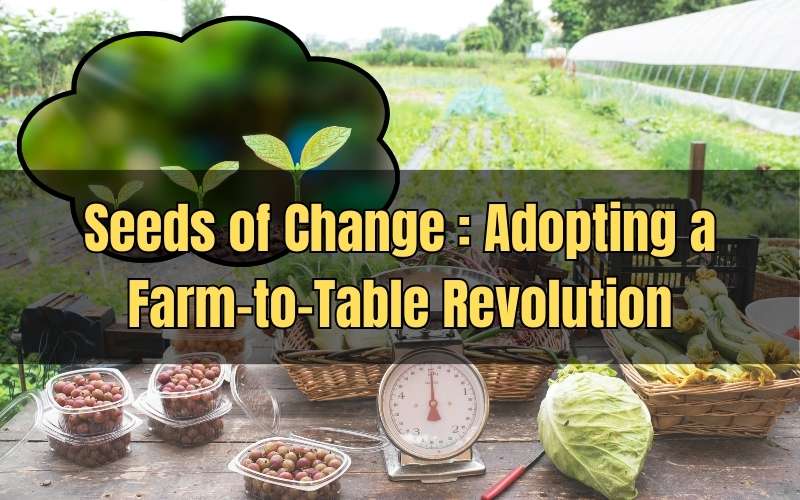Understanding
Farm-to-Table Revolution: In recent years, the farm-to-table movement has gained momentum worldwide, including in India. This movement emphasizes sourcing food directly from local farmers and producers, promoting sustainability, freshness, and community support. Understanding its principles and benefits is the first step towards adopting a farm-to-table lifestyle.
Benefits of Adopting a Farm-to-Table Approach
Freshness:
By sourcing food locally, you ensure that your meals are fresher and more nutritious, as they spend less time in transit.
Supporting Local Farmers:
Buying directly from local farmers supports the local economy and helps small-scale producers thrive.
Environmental Sustainability:
Farm-to-table practices reduce the carbon footprint associated with food transportation and support environmentally friendly farming methods.
Connection to Food:
Knowing where your food comes from fosters a deeper connection to the land and the people who grow it, promoting appreciation for food and its journey to your plate.
Practical Tips for Adopting a Farm-to-Table Lifestyle
1. Explore Local Markets:
Visit farmers’ markets and local stores to discover fresh, seasonal produce grown in your region. Engage with farmers to learn about their farming practices and the story behind the food.
2. Join Community Supported Agriculture (CSA) Programs:
CSA programs allow you to subscribe to regular deliveries of fresh produce directly from local farms. This not only ensures a steady supply of fresh ingredients but also strengthens your connection to the local farming community.
3. Grow Your Own:
Consider starting a small kitchen garden or growing herbs on your balcony. Even limited space can yield a variety of fresh produce, adding a personal touch to your farm-to-table journey.
4. Plan Seasonal Menus:
Embrace seasonal eating by planning your meals around the availability of local produce. Experiment with new recipes that highlight the flavors of each season’s bounty.
5. Reduce Food Waste:
Minimize food waste by buying only what you need and incorporating leftover ingredients into future meals. Composting organic waste further supports sustainability efforts.
Overcoming Challenges
While adopting a farm-to-table lifestyle, you may encounter challenges such as limited availability of certain ingredients, higher costs compared to mass-produced alternatives, and the need for more frequent shopping trips. However, by gradually incorporating farm-to-table practices into your routine and focusing on the benefits they offer, these challenges can be overcome.
Conclusion
Embracing a farm-to-table revolution is not just about the food on your plate; it’s about embracing a sustainable, community-focused approach to eating. By understanding the principles of the farm-to-table movement, exploring local options, and making conscious choices, you can contribute to a healthier, more sustainable food system while enjoying delicious meals that celebrate the flavors of your region. Start small, experiment, and let the seeds of change flourish in your kitchen and community.
Adopting a farm-to-table revolution offers more than just a change in diet—it’s a transformative shift towards a more sustainable, community-oriented lifestyle. By understanding the principles and benefits of the farm-to-table movement, exploring local markets, joining CSA programs, and incorporating seasonal ingredients into our meals, we can actively contribute to a healthier food system while supporting local farmers and producers.
While challenges may arise along the way, such as limited availability and higher costs, the long-term rewards outweigh these hurdles. Through commitment and conscious choices, we can overcome these challenges and reap the rewards of fresher, more nutritious meals that celebrate the flavors of our region.
So let’s embrace the seeds of change and cultivate a farm-to-table revolution in our homes and communities. Together, we can sow the seeds of a brighter, more sustainable future, one delicious meal at a time.
Know more about author: Prince Khanuja And Khanuja Group




